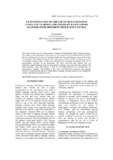| dc.contributor.author | Paul, Pankaj | |
| dc.date.accessioned | 2013-06-12T06:49:31Z | |
| dc.date.available | 2013-06-12T06:49:31Z | |
| dc.date.issued | 2012 | |
| dc.identifier.uri | http://hdl.handle.net/10361/2608 | |
| dc.description.abstract | This study explores the use of metacognitive strategies by Bangladeshi English language learners.
The number of total participants in this study was 100 students, 50 at the high proficiency and 50 at
the low proficiency level, who were studying English for Academic Purpose courses at the Centre
for Languages (CfL), BRAC University. The metacognitive section of Oxford’s Strategy Inventory
of Language Learning (SILL) (1990) was administered to investigate the pattern of the use of
metacognitive strategies by the participants. The study discovered that students with low
proficiency English language skills use metacognitive strategies more frequently than students with
high proficiency skills, and students of both low and high proficiency are frequent users of
metacognitive strategies. The findings of this study will help both researchers and language
teachers to understand the pattern of metacognitive language learning strategy use by Bangladeshi
learners with different proficiency levels. | en_US |
| dc.language.iso | en | en_US |
| dc.publisher | BRAC University | en_US |
| dc.relation.ispartofseries | BRAC University Journal, BRAC University;Vol. 9, No. 1 & 2, 2012, p. 47-56 | |
| dc.subject | Language learning strategies | en_US |
| dc.subject | Metacognitive strategies | en_US |
| dc.subject | Language proficiency | en_US |
| dc.title | An investigation on the use of metacognitive language learning strategies by Bangladeshi learners with different proficiency levels | en_US |
| dc.type | Article | en_US |

